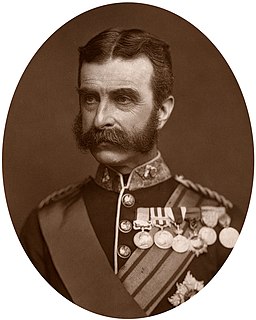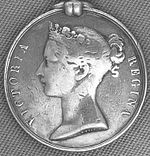
Napoléon, Prince Imperial, also known as Louis-Napoléon, was the only child of Napoleon III, Emperor of the French, and Empress Eugénie. After his father was dethroned in 1870, he moved with his family to England. On his father's death in January 1873, he was proclaimed by the Bonapartist faction as Napoleon IV.

The Anglo-Zulu War was fought in 1879 between the British Empire and the Zulu Kingdom. Following the British North America Act of 1867 for the federation in Canada, by Lord Carnarvon, it was thought that similar political effort, coupled with military campaigns, might succeed with the African Kingdoms, tribal areas and Boer republics in South Africa. In 1874, Sir Bartle Frere was sent to South Africa as High Commissioner for the British Empire to effect such plans. Among the obstacles were the armed independent states of the South African Republic and the Kingdom of Zululand.

The Battle of Isandlwana on 22 January 1879 was the first major encounter in the Anglo-Zulu War between the British Empire and the Zulu Kingdom. Eleven days after the British commenced their invasion of Zululand in Southern Africa, a Zulu force of some 20,000 warriors attacked a portion of the British main column consisting of about 1,800 British, colonial and native troops with approximately 350 civilians. The Zulus were equipped mainly with the traditional assegai iron spears and cow-hide shields, but also had a number of muskets and antiquated rifles.

Lieutenant-Colonel Anthony William Durnford was an Irish career British Army officer of the Royal Engineers who served in the Anglo-Zulu War. Breveted colonel, Durnford is mainly known for his defeat by the Zulus at the Battle of Isandlwana, which was a disaster for the British Army.

Frederic Augustus Thesiger, 2nd Baron Chelmsford, was a British Army officer who rose to prominence during the Anglo-Zulu War, when an expeditionary force under his command suffered a decisive defeat at the hands of a Zulu force at the Battle of Isandlwana in 1879. Despite this defeat, he was able to score several victories against the Zulus, culminating in the British victory at the Battle of Ulundi, which ended the war and partly restored his reputation in Britain.

General Sir Redvers Henry Buller, was a British Army officer and a recipient of the Victoria Cross, the highest award for gallantry in the face of the enemy that can be awarded to British and Commonwealth forces. He served as Commander-in-Chief of British Forces in South Africa during the early months of the Second Boer War and subsequently commanded the army in Natal until his return to England in November 1900.

Henry Cecil Dudgeon D'Arcy VC was a New Zealand-born recipient of the Victoria Cross, the highest and most prestigious award for gallantry in the face of the enemy that can be awarded to British and Commonwealth forces. He won the VC on 3 July 1879 at Ulundi in South Africa during the Anglo-Zulu War when he was 28 years old, and a captain in the Frontier Light Horse.

The Battle of Kambula took place on 29 March 1879, during the Anglo-Zulu War, when a Zulu military force attacked the British camp at Kambula, having routed the mounted element of the British force at the Battle of Hlobane the day before. The battle was a decisive Zulu defeat and the Zulu warriors lost their belief in victory. The war ended after the Zulu defeat at the Battle of Ulundi on 4 July 1879.

The Battle of Hlobane took place at Hlobane, near the modern town of Vryheid in KwaZulu-Natal, South Africa during the Anglo-Zulu War.

The Battle of Ulundi took place at the Zulu capital of Ulundi (Zulu:oNdini) on 4 July 1879 and was the last major battle of the Anglo-Zulu War. The British army broke the military power of the Zulu nation by defeating the main Zulu army and immediately afterwards capturing and burning the royal kraal of oNdini.
Lieutenant-Colonel Henry Burmester Pulleine was an administrator and commander in the British Army in the Cape Frontier and Anglo-Zulu Wars. He is most notable as a commander of British forces at the disastrous Battle of Isandlwana in January 1879. Substantively a major, he held the rank of brevet lieutenant colonel.

The Natal Native Contingent was a large force of auxiliary soldiers in British South Africa, forming a substantial portion of the defence forces of the British colony of Natal. The Contingent saw action during the 1879 Anglo-Zulu War. The Natal Mounted Police was created in 1873 to bolster the defenses of Natal. It enlisted European officers, NCOs and natives. The infantry was created in 1878. Most enlisted troops were drawn from the Basuto and Mpondo tribes, which had had long experience fighting the Zulus.

The South Africa Medal (1880), often referred to as the Zulu War Medal, is a campaign medal instituted in 1880 and awarded by the British Government to members of the British Army, Royal Naval Brigade and Colonial Volunteers who were involved in a series of South African tribal wars in the Cape of Good Hope, Colony of Natal and Transvaal between 1877 and 1879, most notably for the Anglo-Zulu War of 1879.

The Natal Native Pioneer Corps, commonly referred to as the Natal Pioneers, was a British unit of the Zulu War. Raised in November/December 1878 the unit served throughout the war of 1879 to provide engineering support to the British invasion of Zululand. Three companies were formed each comprising around 100 men and clad in old British Army uniforms. The units served at the battles of Isandlwana, Eshowe and Ulundi.

The Natal Mounted Police (NMP) were the colonial police force of the Colony of Natal created in 1874 by Major John Dartnell, a farmer and retired officer in the British Army as a semi-military force to bolster the defences of Natal in South Africa. When required the NMP would be assisted by the Colony's volunteer regiments including the Natal Carbineers. It enlisted European officers, NCOs and natives. Men of the NMP fought and died in the Battle of Isandlwana and at Rorke's Drift during the Zulu War of 1879.

Major-General Sir John George Dartnell KCB, CMG was a British soldier and police officer who was the founder and first Commandant of the Natal Mounted Police. A veteran of the Indian Mutiny, he saw action in every campaign in South Africa from 1879 including the Zulu War and the First and Second Boer Wars.

Sihayo kaXongo was a Zulu inKosi (chief). In some contemporary British documents he is referred to as Sirhayo or Sirayo. He was an inDuna (commander) of the iNdabakawombe iButho and supported Cetshwayo in the 1856 Zulu Civil War. Under Cetshwayo, Sihayo was a chief of a key territory on the border with the British Colony of Natal and had a seat on the iBandla. Sihayo was an Anglophile who wore European clothes and maintained friendly relations with trader James Rorke who lived nearby at Rorke's Drift. By 1864, Sihayo was head of the Qungebe tribe and that year agreed a new western border of the kingdom with Boer leader Marthinus Wessel Pretorius.

The Zungeni Mountain skirmish took place on 5 June 1879 between British and Zulu forces during the Second invasion of Zululand. British irregular horse commanded by Colonel Redvers Buller discovered a force of 300 Zulu levies at a settlement near the Zungeni Mountain. The horsemen charged and scattered the Zulu before burning the settlement. Buller's men withdrew after coming under fire from the Zulu who also threatened to surround them.

The Zungwini Mountain skirmishes took place on 20, 22 and 24 January 1879 during the Anglo-Zulu War. The mountain was a stronghold of the AbaQulusi Zulu tribe, who were reinforced by the forces of exiled Swazi prince Mbilini waMswati. The mountain lay near the proposed route of advance of a British column under Lieutenant-Colonel Evelyn Wood, one of three that marched on the Zulu capital, Ulundi, from early January. Aware that the other columns had made less progress Wood, who had halted to fortify a camp at Tinta's Kraal, decided to deal with the abaQulusi strongholds.




















